Oradea
Come the morning, I set off from my roadside hotel just over the border into Romania. It was raining fairly heavily, and I followed a rather token cycle lane just to the side of the main road, where a long line of lorries and trucks queued towards the border. The winds picked up and it soon began to lash it down — though I had dressed fairly appropriately for the weather, I was drenched in little time at all; I took refuge in a service station shop for a short while, monitoring the forecast and laying out my clothes. Rain was due for the rest of the day, so, when I had dried off very slightly, I set off in a marginally less heavy downpour.
It took me around two hours to reach the centre of Oradea; if there had been any doubt about my boots being on their last legs, it was clear now: water slowly seeped into the soles and pooled within, reducing my socks to squelching pieces of cotton. Adapting my normally unfazed walking style, I tried my best to round puddles and patches of mud. A passing truck decided the moment opportune to drench me further on the side of the road. I splashed my way into the city.
Arriving at my hostel around 1:45pm, I stripped off my sodden clothes and boots: my hands and feet were pink and pruned. The hostel comprised of some dorms, but was also partly open-planned: it was the first time I had seen or experienced such an arrangement. My bed, the top of a bunk, was rather unusually not placed in a dorm, but rather at the back of the communal areas, with a translucent curtain that could be drawn for a semblance of privacy for my bunkmate and me. I tried my best to dry off my clothes, and, about an hour or so later, I headed off to stock up on mundane supplies – deodorant and toothpaste – and withdraw some Romanian Leu. The downpour had abated and I picked up some pastries from Carrefour — a new player on the scene, and a reminder of the apparently enduring – if not slightly odd – French infatuation with Romania!

That evening, I wandered through the old town, in which my hostel was located at the heart, and headed across the Crișul Repede river to the southern neighbourhoods; I pootled around and ended up in a bar with a few new Romanian friends, just off the main square, in the arcade called the Black Eagle Palace. This was the place to be, they said. And so it was.
A return to urban touristing
Recuperation and exploration awaited the next day, and I rose around 10am. I caught up on important admin: the highlights of the first round of the NFL draft from the night before. And then, I quit and grabbed a coffee near Moskovits Palace just down the way, an early 20th century townhouse painted a seaside blue with stucco motifs. Soon after, I wandered down the main pedestrian street, Calea Republicii, where I’d been much of yesterday afternoon and evening.

I grabbed lunch, a burger, on the south side of the river. Passing by the town hall, I made my way back to the river’s edge, where I had previously attempted to enter the Synagogue Neologă Sion; however, a woman had seen me walk down the gravel path to the door and had quickly hung an “open again in 15 minutes” sign before closing the door. When I tried again after lunch, I briefly looked around the interior, only to be abruptly instructed that an entry ticket was needed. I felt I had touristed the site sufficiently and left slightly miffed.

I made my way back to the main square, which I had by now become quite taken with, and sat at a cafe-cum-bar in the arcade of the Black Eagle “Palace” and looked out over the buildings lining the square. The statue of Ferdinand I sat on horseback in the centre. This may be one of my favourite squares of the trip, not least as I hadn’t expected such a grandiose and delicately restored space so early into my Romanian sally. It was a real eclectic mix of buildings and architectural styles, all refurbished beautifully only seven years prior. The blend of edifices all sat abreast around the four corners: the Greek Catholic Episcopal Palace, The church with the Moon, the Black Eagle Palace, the Greek Catholic Church of St. Nicholas, and St. Ladislau Church, all in step along the vertices of the square.


Over the course of the day a couple of child beggars approached me and each and every time I handled the situation awkwardly. And, when they headed off to ask another, I would briefly find myself wondering if I would have succumbed had they accepted card; mortified by these obtrusive thoughts, I purged the shameful notion from my mind.
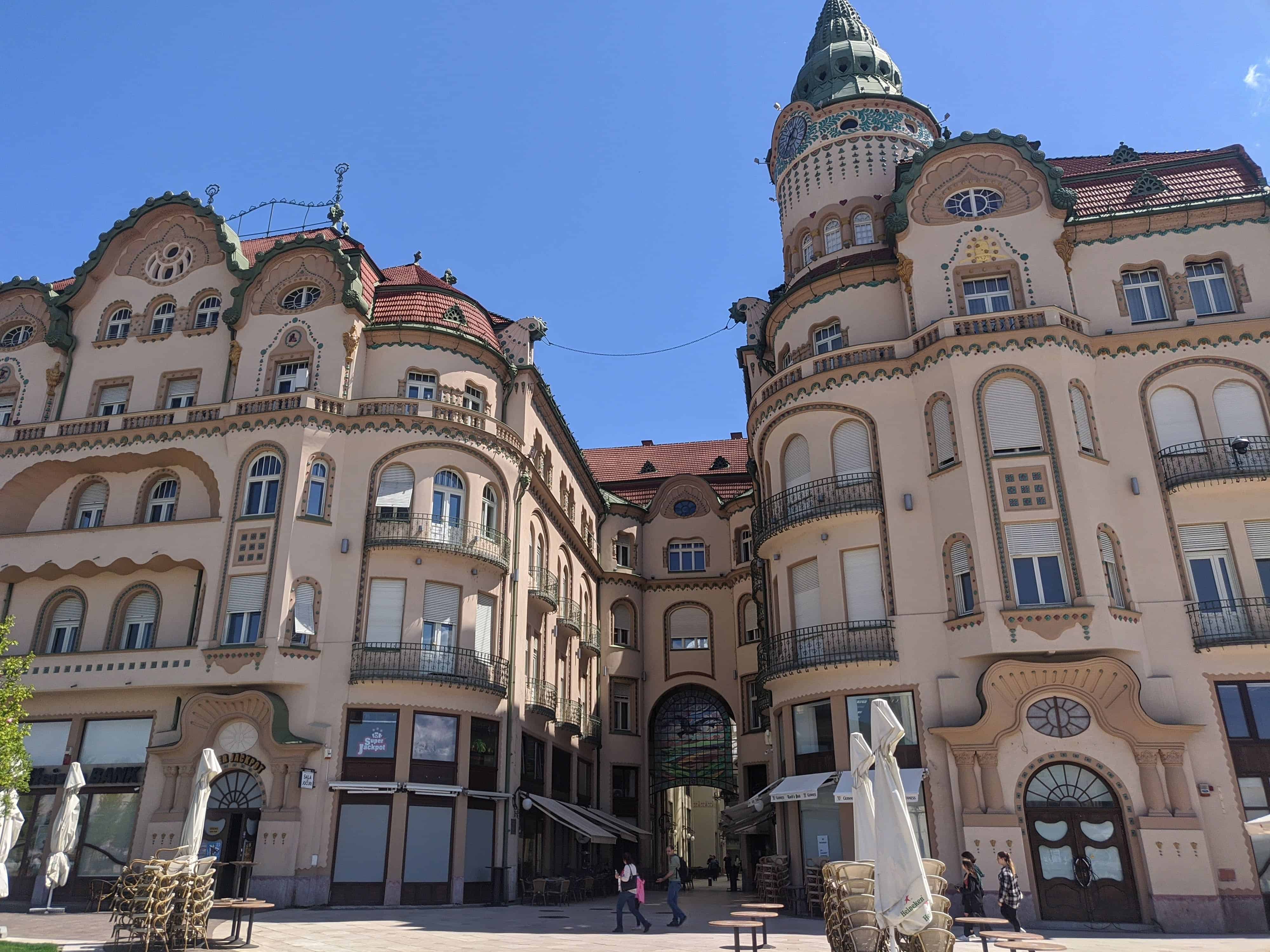
Returning to my bunk that afternoon, I found a different mate on the mattress below – a Texan called Trey – and we struck up a conversation. He enquired if I wanted to go with him to a beer garden around the corner and, after grabbing a couple of kebabs, off we went. Three rounds of Steinkrugs later, night had firmly set in and we crossed the river. Following the sound of music and hubbub of young voices, we ended up in front of a nightclub. A bouncer blocked our way: the club was full, he said. We loitered outside for a minute and, when the bouncer turned to deal with other newcomers, I slipped inside, dragging Trey along with me. Revelling in our victory, we picked up a round of drinks from the bar. It wasn’t long before we somehow ended up on a balcony in the VIP section, surveying the scenes on the dance floor below.
Romani
I departed Oradea first thing the next morning; however, before resuming my walk, I hopped on a train through the southeastern suburbs of town in an unsuccessful attempt to locate a fortified church outside of town that I’d heard mention of the night before — the hazy shroud of the night air had led my memory and morning curiosity astray.
This wild goose chase did, however, include a truly odd interaction with a Romani family. Seated on an aisle seat with my pack on the chair beside me, I gazed through the window at the city which passed slowly by. Soon, the sound of giggling from the chairs behind me caused me to turn around and there two childish pairs of eyes smiled off at me through the gap between the chairs. I had settled myself in a compartment comprised of a handful of communing locals and what I soon discovered to be a single large family of 8 or so children of varying ages and their mother. Taking my look behind me to be an invitation, two young girls of about six years old ran out in front of me, where I sat in a group of four seats, and collapsed into the two chairs opposite. Over the next few minutes, they nattered incessantly amongst themselves and, at random moments, called over to me in rapid Romanian, each time giggling at my blank looks. Eventually, through gestures and attempts to parrot back the words they said, I deduced the two girls to be sisters; and soon, they took it upon themselves to teach me to count to 10 in Romanian and I returned the favour in English. This wholesome (if chaotic) episode was marred by interspersed moments when the girls would abruptly pause their chattering, and proffer grubby palms in my direction; each time I apologised that I had nothing to give, but, by then, they had long returned to their energetic conversations. Displaying airy, short-term forgetfulness – or is it indifference – common to all young kids, this cycle repeated a couple of times. Soon, they started singing.
The saga was much to the amusement of others on the train; this bemused Brit entertaining the childish giggles and intrigues of two charming Romani children. The girls wore tattered clothes, which bore faded sportswear logos, and on their feet, they sported battered, old trainers, the soles of which had been so worn away that they resembled socks. If their poor and dirty outlook was even of note to them in their bubbling state of excitable youth, they did not show it.
Occasionally, a younger boy, who I came to realise was their brother, would appear, jumping up and down the carriage, trying to join in the fun, but his sisters would turn all serious and push him away, lest he scare off their foreign audience, sporting a strange old black rucksack, almost the size of their little figures. The mother appeared at one point (for I had figured out by now that this was all one overflowing family), and the younger brother tried to hide behind my bag; the old woman exclaimed and, shouting in rapid Romanian, retrieved a wooden paddle and began lightly rapping her son on the head. The carriage stank of stale tobacco smoke.
Just before I alighted, the rest of the eight children crowded around me: the children became excessively comfortable, trying to stroke my hair or my leg, or feign hitting me with the paddle that they had somehow wrangled off their mother. A young woman in the aisle opposite attempted to ask the kids to desist, but the drama took another confusing turn: the mother seemed to have taken issue with our (the non-familial) presence in this part of the carriage. We left, but not before the kids jeered and one tapped me on the tucchus with that same wooden paddle! An intriguing early foray into rural Romania.
Carpathians
Back on track, I vaguely followed the course of the Crișul Repede river from Oradea into the heart of Bihor county. Soon I found myself in a wide valley, flanked by the beginnings of the western Carpathian mountain range, whose green mountains slowly but surely sprouted up around me. The Carpathians had always held a symbolic place in my mind: they signalled my imminent ingress into Transylvania.

By 4pm, I had arrived in Aleșd, a town in the centre of the valley’s plain. I had managed to procure a room in a bungalow pension as my accommodation for the night, the walls of which were covered with shelves of cassette tapes and weather-beaten novels. For an hour or so, I played basketball in the makeshift court that the hotelier’s son had put together, before walking into town to grab some supper.

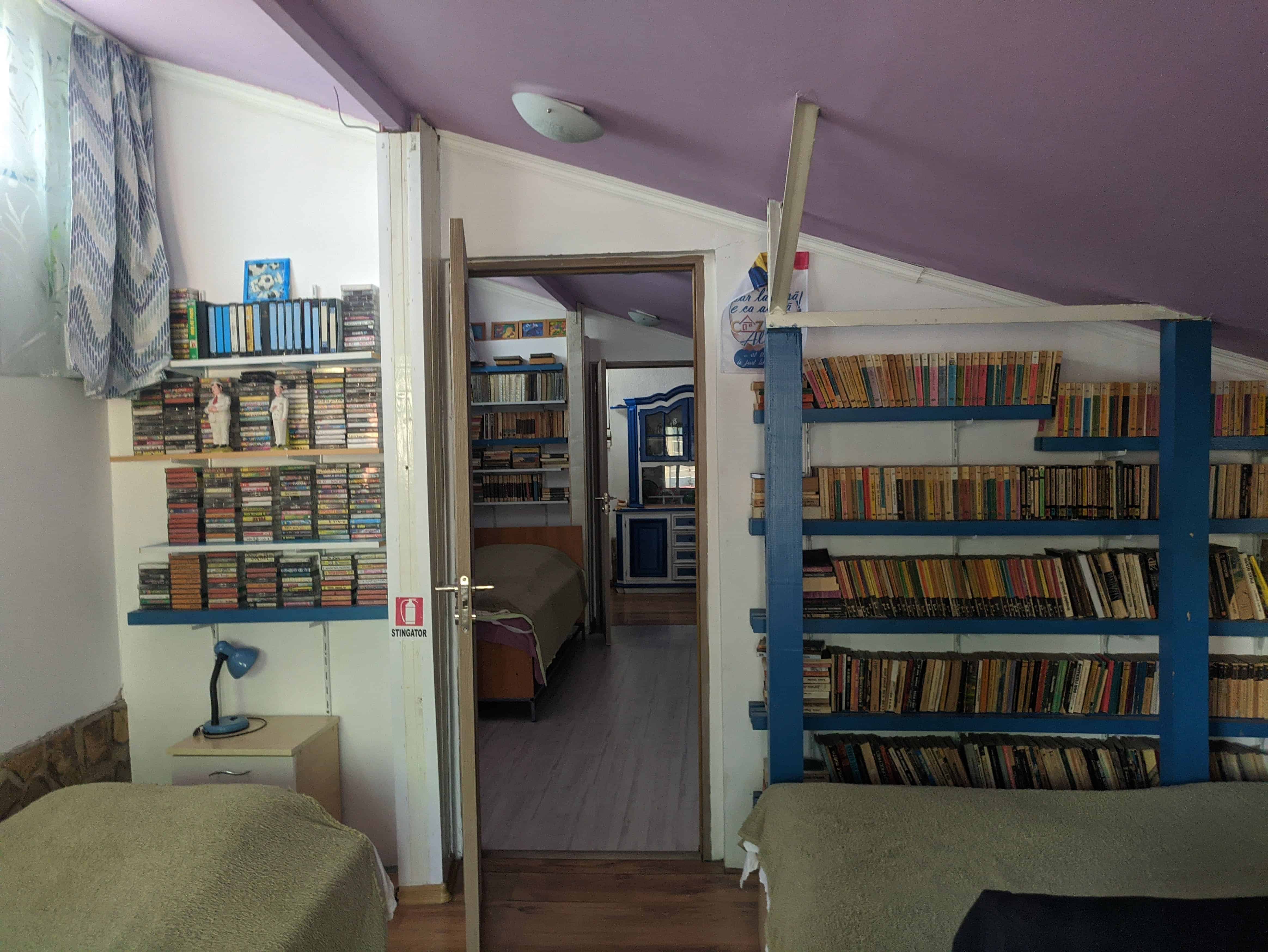
As I strolled through the town at night heading back to my lodgings, a stray black dog led the way down the road ahead of me. After a few minutes, he paused and looped back behind me: it was my turn to lead. When I turned back, he had stopped and sat at the side of the road, his sullen, sad eyes watching me go. Reluctantly, I dragged myself away, down further into the darkness of the valley.
Swaddled in my bed, I fell asleep under a sea of stars, the smoke from a campfire just outside, and the braying of a lone wolf just around the corner.
Massif
The next day, just west of Bucea, I entered into Cluj County, definitively marking my arrival in Transylvania. For a while, I followed a path adjacent to the quiet railway line connecting Oradea with Cluj; a single line of tracks spanned most of the stretch, and I paused at the odd station to refill my water bottle — at some point, I even struck up a brief Spanish conversation with a Catalonian awaiting a train, who had enquired as to where I was headed.
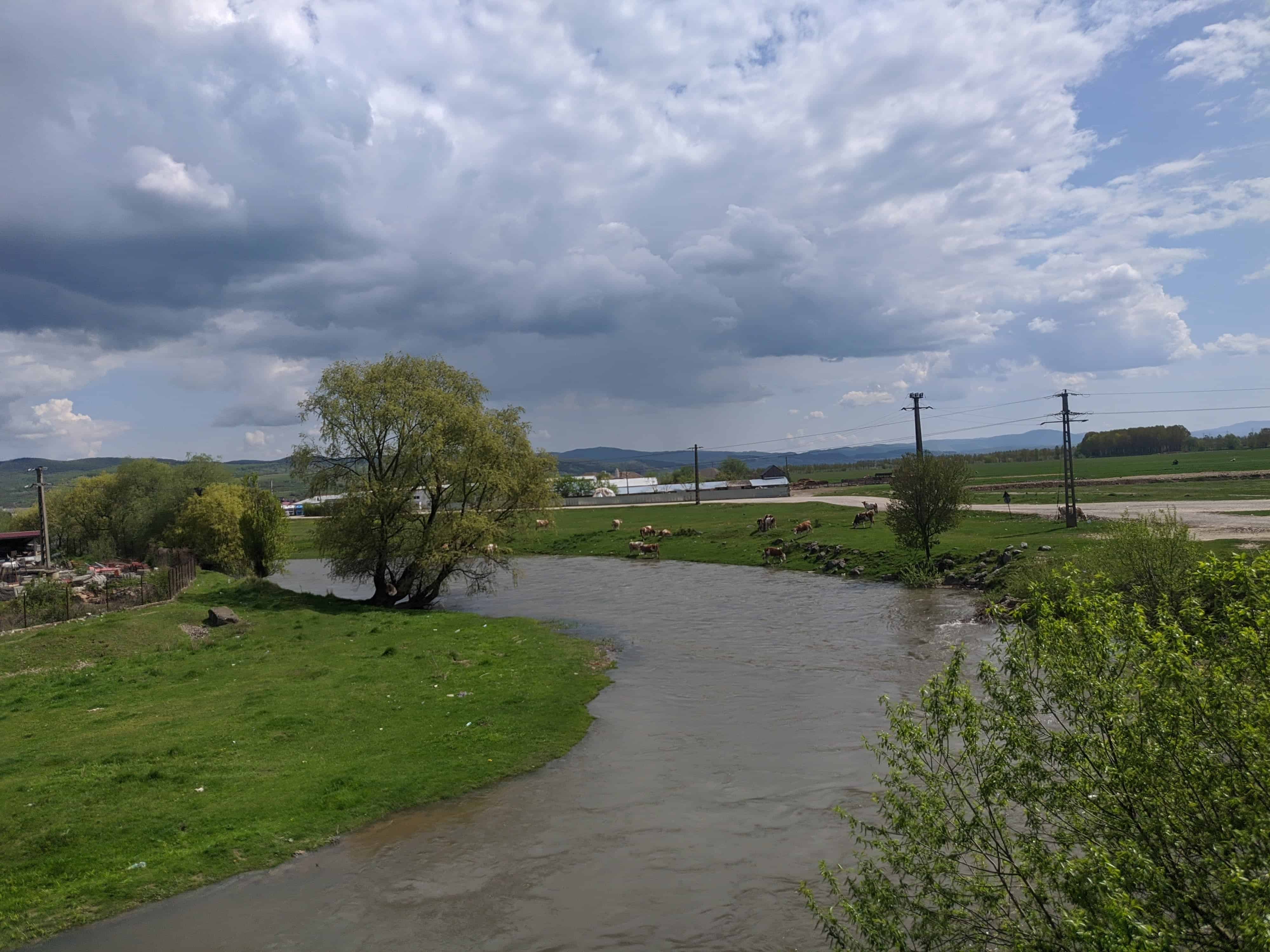
By now, I was inexorably heading into the mountains, and my research of the surrounding terrain revealed the complexity (and subjectivity) of alpine geography: the mountains that surrounded me make up the Bihar Mountains, a massif of the Apuseni Mountains, which in turn constitute a section of the Carpathian Mountains — complex stuff, but a rewarding exercise in putting me on the map of a new land and the beginnings of a new leg of the walk, in very different terrain.
The valley through which I was walking, had narrowed as I followed the river Crișul Repede and its meanders; the increasingly dense forests on the mountainside were packed with deciduous greenery, forming stark sylvan hills, and obscured, distant crags.

At one point that day, far from a town, I espied a shadowy form out down my path. Mistaking a large stray for a wolf, I paused for a moment, wide-eyed, as it headed slowly and deliberately in my direction with clear interest in its eyes; I scrambled up a bank until I reached the (relative) safety of railway tracks on a bank above the canine lurking somewhere in the shrubbery below. Having hopscotched over the rungs of the tracks in the meantime, it was half an hour until I was bold enough to descend back to the path below.


As my walking day neared its end, I rested a while on the porch of an abandoned, unfinished house by an old stone well. (Abandoned construction works were not an uncommon feature of my time traversing Romania.) The sounds of a local A road and the occasional passing train rung out as I paused in the shade. I noted how the increasing number of red bug-bite blotches across my limbs and torso marked (if somewhat grotesquely) my progress into the realm of the exotic and into Summer — that, and the ever bolder fauna crossing my path: the ants and flies of Northern Europe had given way to snakes obscured in the tall grasses and the threat of wolves and bears lurking in the hills above.
The road to Cluj
The next morning, I left my roadside motel and walked along the A road into Ciucea — a collection of houses more than anything of any size. That said, I also passed the “castle” where Endre Ady, the great Hungarian poet, lived during WWI. I use “castle” lightly: my experience in Romania thus far has been that it is often applied in that vague, all encompassing way that the Russians wield the term “dacha”.


Passing through the town of Poieni, I spotted farmers in a field, at work by a great stack of twigs arranged in a wigwam-like structure: just two men brandishing long wooden hoes and a woman in a brightly patterned dress carrying a bucket of water alongside. The first snowy peaks materialised as I came within five or so miles of Huedin. The reserves of snow on even the highest of peaks had been almost entirely depleted by the strength of the spring sun, revealing much of the rugged summits and hummocks.

Another series of confrontations with feral mutts by the roadside sparked a review of possible warding-off tactics; the method I implemented that day, was to wait until a host of lorries blocked the way over the road and use that opportunity to pass opposite a stray dog who had caught sight of me.

With Huedin in the distance, I cut through a field and zeroed in on town. As I neared, I spotted rather incongruous, oriental-style buildings, complete with terraced red roofs. Soon, I found myself amongst them and realised that almost without exception, these palatial complexes remained incomplete — these were not the work-in-progress houses of the aspirational classes, that I initially surmised; instead, they constituted the homes of the Romani community of town. Though charming from a distance, up close, they appeared hollow and tacky: the near-squalid conditions the Romani had been relegated to (through economic struggle) in the periphery of the small city.

After a long day largely spent following the Oradea-Cluj A road, I arrived in Huedin around 5pm. It was a long and tiring day of walking down the side of a rambling road, taking regular pit stops as I passed through small villages or aside fields, level crossings, and intersections. In reality, the little time that I spent off the A road today was spent in the final couple of miles. Though a shorter day on paper than the last two, I arrived weary and hungry. (The manner of this route was brought about through necessity; otherwise, a 13-hour non-stop trek through the mountains if I were to follow a route involving other, more “off-road” paths.) After a strained, but ultimately successful excursion to the local post office, I made my way through Huedin to a cheap hotel on the far side of town: an incoherent concrete block in the middle of a field.

Mountaineering
The day had come. To avoid a repeat of the roadside walking of the day before and for immersion, my route this day was designed to take me up through the hills and lower mountains reaches. Following a faded mountain path, I climbed through sloping fields up towards the acme of the low mountain I was scaling. The zenith was flat and covered in thick forest: at the edge of the trees, I spotted some tracks and slipped into the glade.
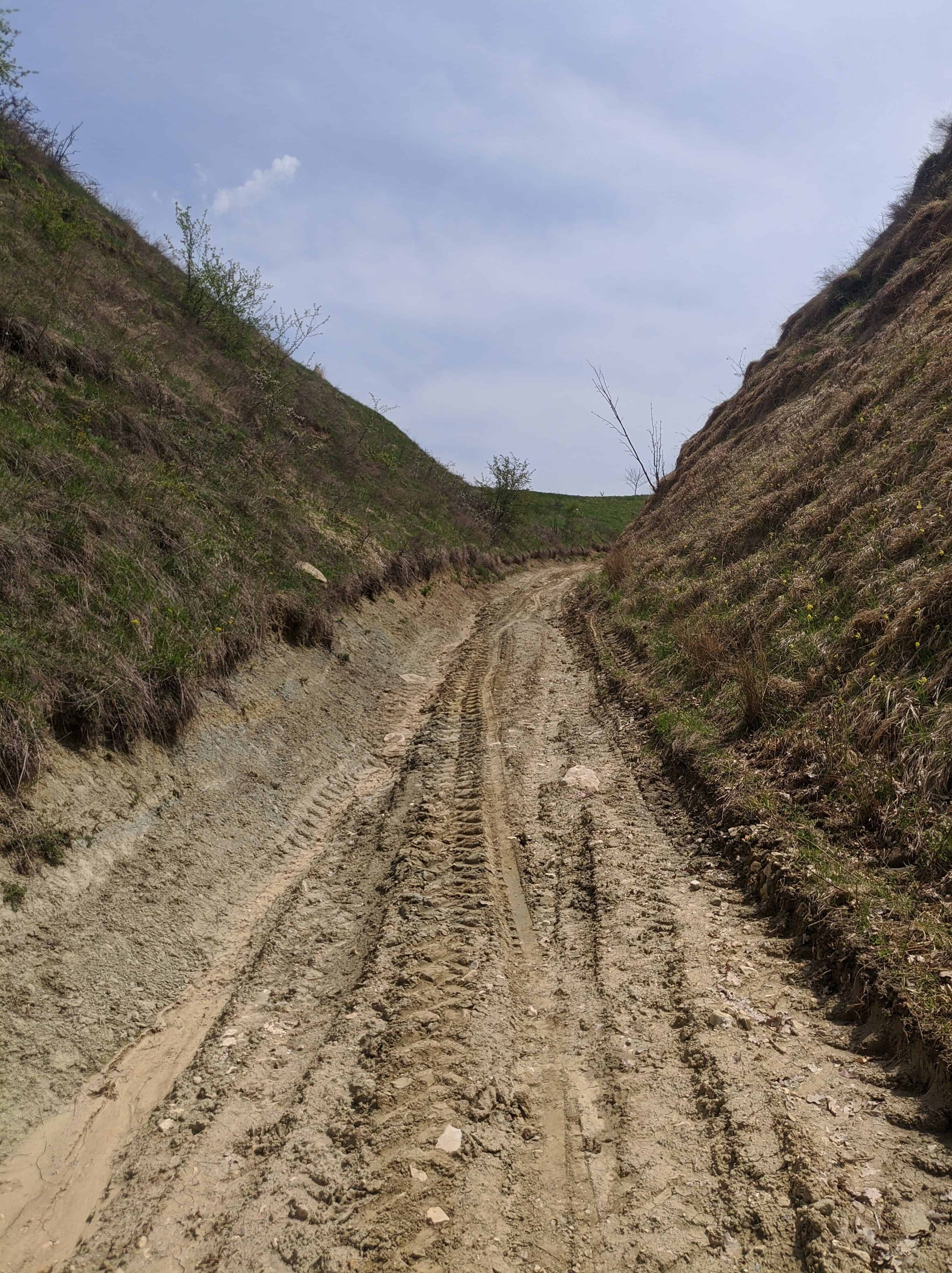
Walking amongst the trees, I skittered around patches of wet clayey mud, scrambling up banks and clasping onto rogue branches that reached out towards me across the forest. Nearing the end of the undergrowth, a glinting trickle rose over the path ahead of me, from one patch of tall grass into another opposite: a stream of rushing geckos, their scales a deep cerulean blue, flowed like ants or a spring of highland water.
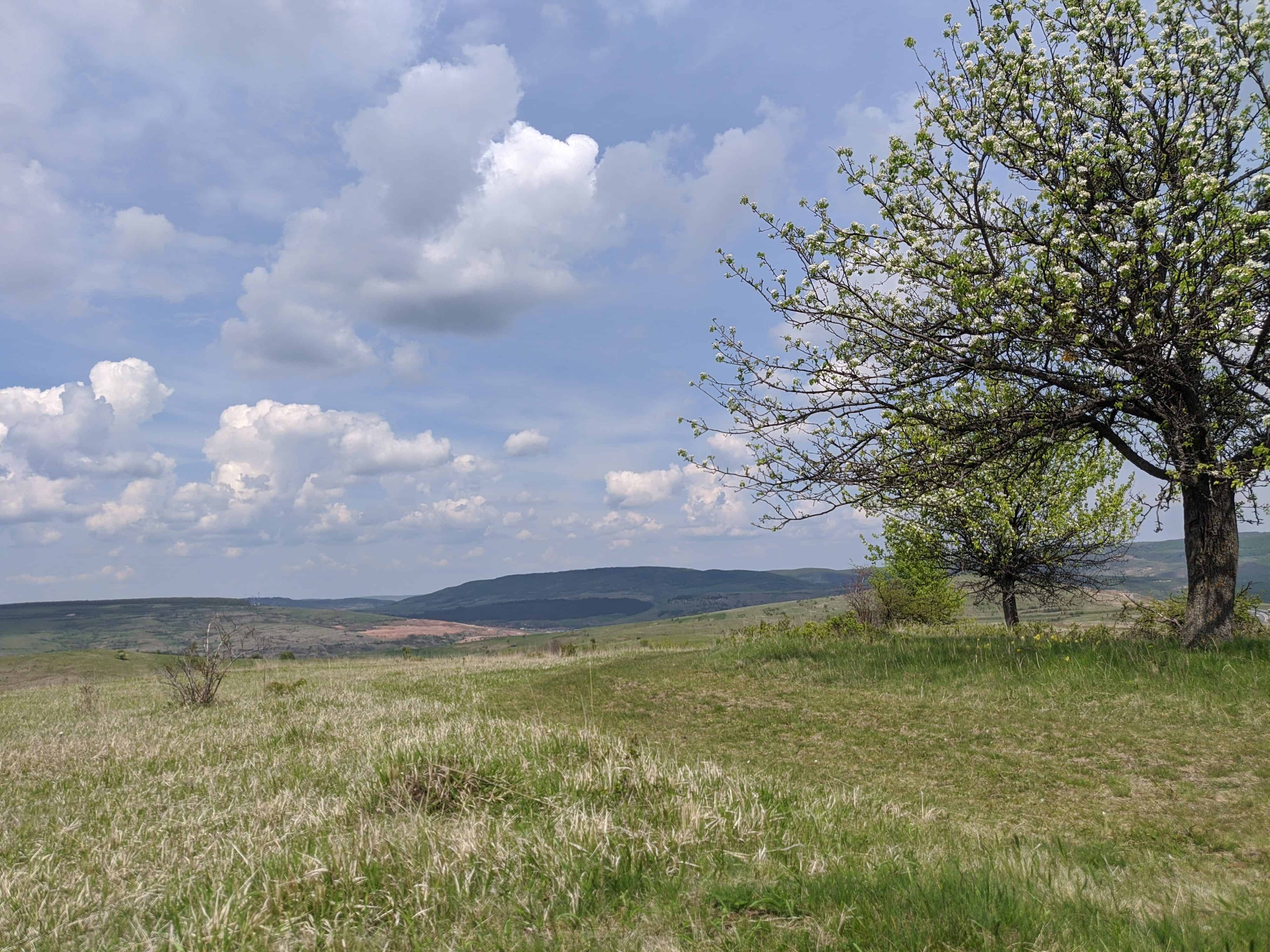

Later, in the early evening, I found myself on the swings of a campsite a few miles west of Gilău, having earlier descended back down into a section of the vale. Suspended in the valley air, lilting to-and-fro, I drew campsite parallels with my stay in the spa town of Túrkeve, along the Great Plain, however this Romanian iteration was much quieter (it was apparent I was the lone presence on the site) and more stereotypically scenic (in the valley between two low mountain ridges — quite the contrast to the flat terrain of the Steppe).
Before long, the winds picked up and then the rain began to fall, drumming its muffled cadence on the roof of my wooden cabin. Flanked by two green mountains, darkness enveloped and I followed: ensconced in dream.
I avoid needless death
Generally speaking, the weather over the last couple of weeks was getting noticeably hotter — the thermometer gaged consistently in the mid-20°Cs, even in these naturally cooler mountains regions!
I dragged myself away from my austere valley lodge in the early hours of the morning: I was soon expecting a visitor! On the far side of Gilau, I struggled to find the river-crossing that my map had promised. I was far from the nearest alternative crossing point, and I traced around the riverbank in hope that I might spy the rumoured bridge or even a passable fording point; however, the river was too wide, and my staff of old, which might have inspired a parting of the waters evocative of Exodus, had long since drifted off down the Danube.
A man emerged from a shack a hundred meters back from the water’s edge. My knight in shining armour, he was not. It transpired that he was a truck driver and he called out to me, pointing to the motorway bridge high above our heads. In broken English, he insisted I could cross the river following his instruction: as suggested, I climbed under some barbed wire and precariously ascended some 40 meters up to the motorway bridge. Having reached this giddy height, I glanced around for the “foot crossing” the man had promised. He shouted something from down below and it dawned on me: Mr van man wanted me to shuffle over the 6-inch wide ledge by the motorway for half a mile before descending on the other side. That, or walk into traffic on the motorway itself.
Fortunately, I did not have a death wish — besides, there are more elegant ways to go which do not involve a narrow concrete ledge, speeding cars, and the threat of an unusually strong gust of wind: I descended. The man was not impressed. He withdrew into his hut and returned with a hi-vis vest, which he proffered — but visibility was the least of my qualms with his plan.
“We van drivers do this sort of thing all the time”, he proclaimed, beating a flabby chest that was just about roped in by a stained vest. Somehow, I doubted it.
I told him I would ascend on the other side of the bridge, out of his view. There, I fled through a farmer’s field, where an elderly wife stood tending to the crop. Bemused, she wished me good day, and I retraced my steps to a more suitable juncture. The motorway bridge shuffle saga had delayed me, eating in to my early start that morning, and I was rushing towards Cluj.
Road-trip pending
A few hours later, I arrived in a western suburb called Florești. Sat on a step in the midday sun, a silver hire car pulled up — and out stepped my dad!
After a brief reunion coffee at a local bakery, I threw my pack in the boot, and hopped into the shotgun seat. The sleepy village of Alsheim in the Rhineland-Palatinate – our last meeting – was a long time ago. Now, some ways down the path, a short-and-sweet Romanian road trip beckoned.

Sounds a bit more brutal in tone. And then to make matters worse, up pops your dad…
The pictures are fantastic! Your descriptions had me right there. It is almost a world of 50 years ago.
No pampered tourist here! That sad little black dog that was sorry to see you go. Encounters like that
stick with you .. as did the Romani children who are coached to beg. Sad. Can’t wait for the next chapter!
You are amazing Noah!!
Another fascinating chapter Noah in your great journey.
So pleased you did not try to crossthe river on the motorway edge!!
Your boots did well -so pleased Dad arrived with new ones.
Well done with children on the train- what an experience!,
Best wishes, Grandpops xx
Wonderful what an interesting journey you are having very brave talking to all these people you do not know
Take care and we will see you soon
Granny
This makes Deed look way cooler than he is
He’s one cool dude, Fredene